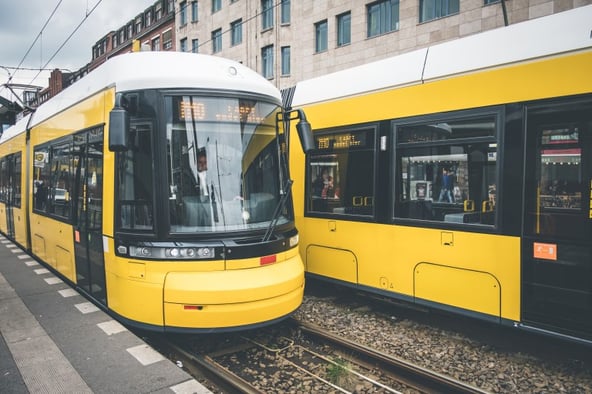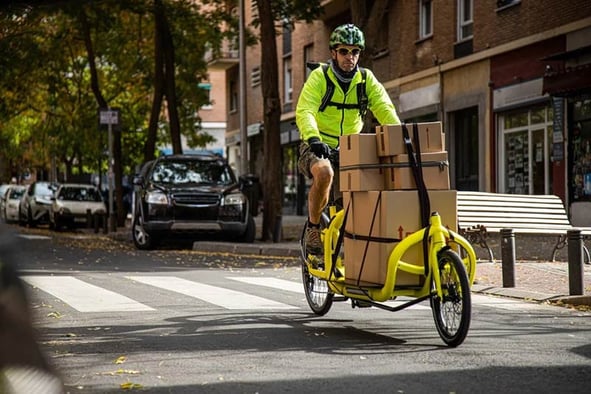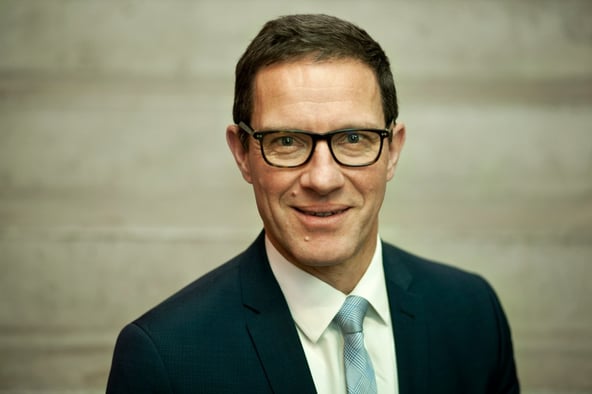Mega-cities, traffic jams and a rapid growth in online trade – what does this mean for the last mile? Professor Dr. Kai-Oliver Schocke, Director of the Research Lab for Urban Transport at the Frankfurt University of Applied Sciences, takes a close look at the last mile. You can read his forecasts here.
Professor Dr. Kai-Oliver Schocke has established the Research Lab for Urban Transport (ReLUT). Here, the last mile of the future is being researched. The aim is to develop solutions with partners from science and practice to improve the quality of life in growing cities.
In his opinion, these five trends will determine the near future:
Trend 1: The future of the last mile is open to experimentation
The last mile holds many challenges – and many opportunities. “At the end of it all is the end user. They expect the package to be delivered exactly as specified,” says Prof. Schocke. “On the other hand, there is the volume of parcels sent to private customers, which is growing by about ten percent annually.” This is where the big challenge arises. It is obvious that delivery trucks that are constantly stuck in traffic jams and parked in second row are not a permanent solution. But what is the solution?
“Parking garages are awesome temporary logistics spaces!”
Professor Dr. Kai-Oliver Schocke, Direktor des Research Lab for Urban Transport an der Frankfurt University of Applied Sciences
The Last-Mile-Lab ReLUT develops under shock management alternatives for parcel shipping. One example: the “LastMileTram” project in Frankfurt. In cooperation with the delivery service provider Hermes, trams on the outskirts of the city are being loaded with a container full of parcels as a test.
At certain stops, the container is unloaded and taken over completely by a cargo bicycle. “In many districts, delivery by bicycle is cheaper than by sprinter – and more environmentally friendly.” Although not all parcels can be delivered by bike due to their weight, according to Schocke, 70 to 80 percent of them can be delivered by bike.
 Does the future of parcel delivery lie on rails? According to Professor Dr. Kai-Oliver Schocke, there is great potential here. (Photo: Adobe Stock)
Does the future of parcel delivery lie on rails? According to Professor Dr. Kai-Oliver Schocke, there is great potential here. (Photo: Adobe Stock)
The Lab also calculated the profitability of “LastMileTram” – the result: the future of the last mile could, at least in part, lie on rails. A further advantage: Only little space is needed for unloading. Because logistics space is scarce in cities.
But here too there is potential in unexpected places: “We looked at the car parks in Frankfurt and Cologne and found that – with the exception of Advent Saturdays – they are filled to a maximum of 80 percent”. The empty spaces could be used: Trucks could deliver containers here and bicycle couriers could pick up the packages for local delivery. “Parking garages are ingenious temporary logistics spaces!”
These examples stand for a flood of ideas and projects that show that the last mile will bring a lot of new things: Cable cars could transport parcels into the cities, tunnels under city traffic could ensure faster delivery or trams could serve as means of transport. According to Schocke, however, not one method leads to the goal. The last mile of the future will be versatile. His conclusion: “There will be no universal solution.”
Trend 2: Pick-up instead of home delivery – because the latter will cost something
Places where customers can collect their parcels themselves will be very popular in the future, according to Schocke. The logistics professor predicts urban mobility points, such as those already in place in Hamburg at the Berliner Tor S-Bahn and U-Bahn station, “pick-up points at transfer points where you can also switch from the S-Bahn to a rented bicycle or e-mobile – and also pick up or drop off your parcel”.
Kiosks or shops with long opening hours, such as the Berlin “Spätis”, where you buy food, drinks and newspapers and which are often neighbourhood meeting places, could also become such places.
“Our ideal: You have a local depot, or even a parcel shop. There you can pick up or drop off your parcel – and you can have a coffee here too.”
Professor Dr. Kai-Oliver Schocke, Director of the Research Lab for Urban Transport at the Frankfurt University of Applied Sciences
Home delivery will still be in demand, but it will cost the customer something. In this context, according to Schocke, local trade will also play a greater role than it does today. They could be both stationary and e-commerce shops and deliver their goods to the neighbourhood.
“Older people in particular, who are often unable to leave their homes, could benefit from such an opportunity,” says Schocke. “Delivery in combination with local trade could become a big market.” Shocking ideal: “You have a local depot, but you can also have a parcel shop. There you can pick up or drop off your parcel – and you can have a coffee here too.”
Trend 3: The last mile becomes more sustainable
The efforts are all aimed at acting more environmentally friendly on the last mile. Many delivery services have already switched over to electricity. More and more freight bicycles will be used and the alternatives mentioned by Schocke, such as trams or cable cars (see Trend 1), which are also far more ecological than diesel trucks that are still in use today.
 Freight bikes are the future on the last mile. Already today you can see many people in the cities delivering parcels. (Photo: Adobe Stock)
Freight bikes are the future on the last mile. Already today you can see many people in the cities delivering parcels. (Photo: Adobe Stock)
“It’s no fun for a parcel post driver to be running up and down stairs all the time.”
Professor Dr. Kai-Oliver Schocke, Director of the Research Lab for Urban Transport at the Frankfurt University of Applied Sciences
Schocke is also thinking about the human resource, because sustainability must be viewed holistically: “For a parcel driver, it is no fun to constantly walk up and down the stairs – fully loaded – not to meet people, not to get rid of many parcels, to stand in a no-parking zone and to experience hostility. Therefore, the researcher advocates appropriate working conditions that go hand in hand with sustainable solutions and appropriate pricing of the delivery service.
More sustainability can also be achieved in the area of returns – by sending back less. The reason for the significant return rate is that market leaders offer free shipping and returns. According to Schocke, this will most likely change in the future. Just like parcels sent directly to the home (see Trend 2), returns will probably also have their price – and automatically reduce the returns rate.
All in all, he says, e-commerce is no more harmful to the environment than going to the retailer in the city centre – as long as deliveries are sustainable. “Studies have shown that sending a pair of shoes, for example by bicycle delivery, leaves a smaller ecological footprint than driving to a shoe store in the city.
Trend 4: Out to the country
In visions of the future, it is often drones or delivery robots that circle over cities in large numbers and supply many customers there. Schocke considers this unrealistic. Drones are not suitable as delivery vehicles for the large number of parcels alone. But the situation is different in rural areas. Here, the drone could be useful, for example for delivering medicines.
In any case, ensuring delivery in rural areas is a challenge in its own right, which naturally requires a different focus. After all, it is often not two minutes’ walk between the individual unloading points as in the city, but a 20-minute drive. But Schocke also sees plenty of room for innovation on the rural last mile. One example is the Landlogistikproject in the federal state of Brandenburg. Here, buses take care of the parcel delivery. This works very well and is therefore trend-setting.
“Rural areas will become more attractive with new delivery solutions.”
Professor Dr. Kai-Oliver Schocke, Director of the Research Lab for Urban Transport at the Frankfurt University of Applied Sciences
In addition, it may be worthwhile in the case of overland shipments to operate across delivery services, so that one carrier takes over on special weekdays and another on other days. Or that delivery services are divided into communities. “Politicians have to moderate here, since they are, after all, competitors.”
A clever design of last mile shipping could in future even encourage more people to live outside the metropolises. After all, those who reliably receive the things they need for everyday life are more likely to make friends with country life. Schocke: “Rural areas will become more attractive with new delivery solutions.”
Trend 5: Politics must get started
According to Schocke, Trend 5 is more of a statement or even a challenge. Namely to politicians. “What, in my view, would increase the success rate of the countless last-mile projects immensely: if politicians would actually accept the responsibility for sustainable city life. If people were to take a much more strategic approach to the questions of how people move from A to B, and also see the need to provide for the population.”
“If cities have the courage to actually try out mobility and logistics concepts of the future, then small seeds will bear fruit”.
Professor Dr. Kai-Oliver Schocke, Director of the Research Lab for Urban Transport at the Frankfurt University of Applied Sciences
Politics must define the framework conditions so that all those involved can orient themselves accordingly. “If parcel service providers are only allowed to drive e-vehicles due to a law, then that will happen,” said Schocke. However, a shop owner in the city centre has had a diesel transporter for perhaps twenty years and cannot afford a new vehicle – a fair solution is needed for them too.
According to Schocke, a self-regulating system does not work. But: “If cities have the courage to actually try out mobility and logistics concepts of the future, then small seeds will bear fruit”.
“Reliability is more important than quick delivery.”
Professor Dr. Kai Oliver Schockes tip to the e-commerce industry:
“As a retailer, you have to think about how you can keep the delivery promise. Reliability is more important than fast delivery. For customers it is better to know: ‘My parcel will arrive in three days’ than to expect it today, and then it won’t come because something has gone wrong. This is an issue that should be dealt with.”
Facts
-
According to a survey, 60 percent of those surveyed find neutral depots in an urban environment very attractive.
(Source: Hagen et al (2020) Analysis of potential for implementing a central depot with the aim of environmentally friendly and bundled delivery of parcels over the last mile. Final report. Frankfurt University of Applied Sciences)
-
According to the consulting firm McKinsey, the e-commerce market will grow by 10 percent annually worldwide until 2030, five times faster than stationary trade, by the way: The share of online trade will increase from today’s 9 percent to 25 to 30 percent. (Source: McKinsey)

Photo: U. Wolf FRA UAS
About the person
Professor Dr. Kai-Oliver Schocke is Professor of Logistics and Production Management, Dean of the Department of Economics & Law, Head of the Global Logistics (M.Sc.) Program and Director of the Research Lab for Urban Transport (ReLUT) at Frankfurt University of Applied Sciences. After studying at Darmstadt Technical University and Université Louis Pasteur, Strasbourg, he spent 14 years with Degussa AG (now: Evonik Industries AG) in management positions in production, logistics, marketing and with responsibility for the results of a PLEXIGLAS® product line. In 2007 he started his university career as Professor for E-Commerce and SCM at the University of Applied Sciences Worms and followed the call of the Frankfurt University of Applied Sciences (FRA UAS) in 2011.